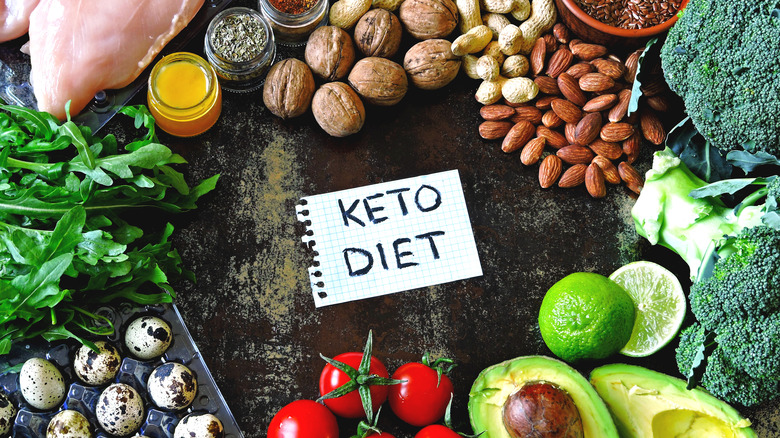Low Carb Vs. Keto Diet: Which Is Better?
When it comes to losing weight, reducing carbs from your daily food intake can work wonders. According to a study published by the Harvard School of Public Health (HSPH), scientific evidence has shown that cutting down carbs from your daily diet can help you lose weight more quickly as compared to a low-fat diet. Moreover, carb restriction can also help you maintain your weight. Another study published in the Cleveland Clinic Journal of Medicine, posted at the National Library of Medicine, shows that a restricted intake of carbs helps the body to get rid of excess water and lower the levels of insulin in the bloodstream. Consequently, you can witness a rapid loss of weight within 15 to 30 days (via Healthline).
Speaking of carb restriction, two types of diets are very popular among people — a low-carb diet and a ketogenic (keto) diet. Since both have turned out to be effective in weight loss and management, it is often difficult to choose between the two. But before making up your mind, it is crucial to know the main difference between the two diets. Continue reading to find out which diet is better for you.
Difference between keto and low-carb diet
The main difference between a low-carb diet and a keto diet is in terms of the percentage of macronutrients (carbs, fats, and protein) that you consume on a daily basis to meet your calorie needs (via Abbot Nutrition News).
A keto diet requires you to increase your fat intake and severely reduce carbs from your daily diet. Ideally, you consume only about 5-10% of your daily calories from carbs, up to 20% from protein, while about 70-80% of your calorie needs are met through your fat intake (Via Abbot Nutrition News). Once you reduce your carb intake — let's say, under 20 grams per day — you enter the state of ketosis.
"[Ketosis is a natural metabolic process in which the body burns fat for fuel," Pamela Nisevich Bede, a registered dietitian for ZonePerfect, told Abbot Nutrition News. "It begins once the body's glycogen stores are depleted."
On the other hand, any eating style in which you consume less than 45% of your calories from carbohydrates can be considered a low-carb diet. In this type of diet, your calories come from foods rich in protein and certain healthy fats, Bede told Abbot Nutrition News.
Which diet is more beneficial?
While both low-carb and keto diets can have several health benefits, if you are specifically focused on losing weight — especially within a short period — then the keto diet is a better choice than a low-carb, says Low Carb Yum. Per the website, increasing the percentage of your daily carb intake to 100 net grams would still be considered low-carb, but it will kick you out of ketosis and slow down the weight-loss process. However, one disadvantage of the keto diet is that even a day of cheating can upset your metabolism.
Registered nutritionist Kristin Kirkpatrick told Cleveland Clinic that if you're on a keto diet and you have a cheat day, or even cheat meal, "a sudden influx of carbs and sugar could wreak havoc on your body."
As a result, you could end up gaining weight, develop bloating and irregular bowel movements, experience fatigue and irritability, and have blood sugar spikes, among other symptoms. On the other hand, if you opt for a low-carb diet, you would not face these symptoms.
Finally, always consult your nutritionist and assess your overall health condition and lifestyle preferences before opting for any kind of diet.


